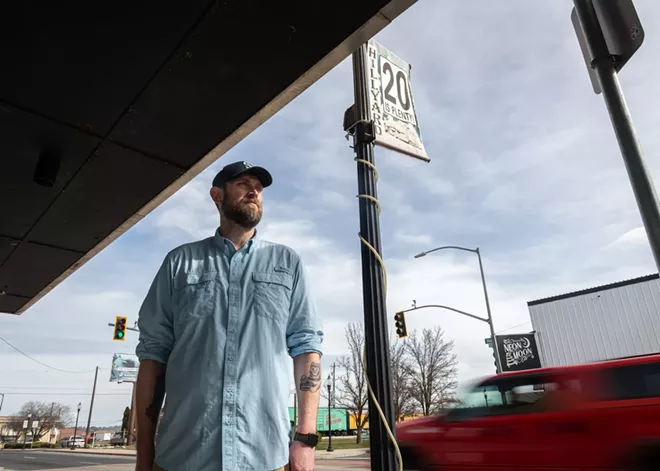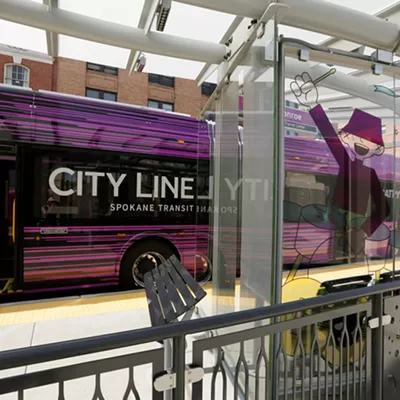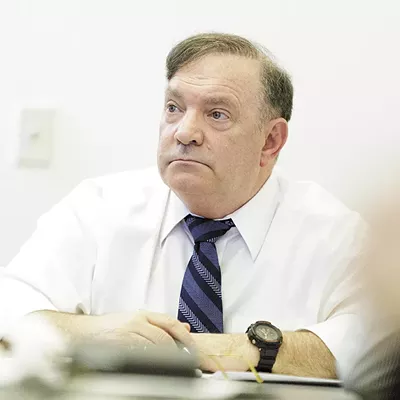
Erik Lowe is trying to cross the street.
He's standing on the edge of the curb in Spokane's Hillyard neighborhood, inches from the cars shooting down Haven Street. There isn't a marked crosswalk, but it doesn't matter. Under Washington state law, every intersection is a crosswalk. Drivers "shall stop and remain stopped" to let pedestrians and bicyclists cross.
Lowe leans his head out into the road, making his intentions clear as a new wave of cars approaches. At 6 feet, 9 inches tall, he's hard to miss.
"I'm going to try to see if they'll stop here," Lowe says.
The first driver whips past, either because they didn't see him or didn't care. Two more cars do the same.
"And there we go," Lowe says, disappointed but not surprised.
When a car in the lane closest to Lowe finally stops, he enters the road immediately, forcing the car approaching in the second lane to stop as well. He crosses with a deliberate confidence — looking straight ahead as if challenging the drivers to object.
"If you don't wave, sometimes they'll f-cking yell at you," Lowe says once he's safely on the other side. (He owns a T-shirt that says "Thanks for not hitting me.") "They get pissed off because they're like, 'Well, maybe I should hit you next time.'"
As he continues along the sidewalk, Lowe raises his voice to be heard over the roar of passing cars.
"We as a society have been so dialed into car culture, and car culture has been so shoved down our throats for over 100 years, we just don't know anything else," he says. "It just allows more people to die on our streets."
SWING FOR THE FENCES
For the better part of a year now, Lowe, a stay-at-home dad and former property appraiser, has been developing a project called "Spokane Reimagined" — a $1 billion tax levy proposal to radically reshape Spokane into a pedestrian- and bike-oriented city.
He stays busy, compiling data on collisions, speaking out at meetings, organizing volunteers, holding public workshops and relentlessly emailing politicians until they can't help but listen to his message. He's met with city planners and several City Council members.
"I've always been the kind of person to swing for the fences," Lowe says.
When he first started advocating for safe streets in Spokane, Lowe says he was largely ignored by elected officials. He still often feels that way. But politicians say they're listening — even if they think his proposals are wildly ambitious and not immediately feasible.
"I definitely appreciate a lot of his efforts to push the conversation around more transit, more pedestrian access and bicycle access throughout our city," says Spokane City Council member Zack Zappone. "Those are really important goals."
Council member Kitty Klitzke says she appreciates how Lowe will share information about collisions that happen in her district.
"That's been super helpful," Klitzke says. "Sometimes he knows more than I do."
Klitzke says she's seen others who dream up big initiatives all by themselves get angry when people don't immediately hand it to them. But she credits Lowe for being flexible and willing to engage on a grassroots level, even if her intial reaction was that his idea was "wildly impractical."
"He's doing the work," Klitkze says. "Even if he is just able to make his points, I think that's meaningful."
Council member Jonathan Bingle, who represents Hillyard, thinks the levy Lowe is proposing is an "astronomical ask" that doesn't seem feasible. But he appreciates Lowe's dedication to making the city a better place.
"I like people with a vision," Bingle says. "And I like Erik because that's a real vision for the city of Spokane."
KILLER ROADS
Lowe is part of a larger movement of safe streets advocates that's grown in recent years as pedestrian deaths in the U.S. surge to record levels.
After declining for decades, the number of people killed by drivers each year started climbing again around 2009. The trend accelerated during the pandemic and, in 2022, the number of U.S. pedestrian fatalities surged to a four-decade high of at least 7,500.
It's a nationwide crisis, and Spokane isn't immune. Last year, drivers killed 23 pedestrians in Spokane County — the highest number on record since 2015, the earliest year that data from the state Department of Transportation is available.
Jacob Cain, a volunteer with Lowe's Spokane Reimagined, says he got involved with the project because he commutes exclusively by bus, and wants to improve transit and walkability in Spokane.
"I do generally find it unsafe to be a pedestrian in Spokane," Cain says.
People have given a number of theories for the recent uptick in deaths — including smartphones, the increasing size of cars and a pandemic-induced breakdown in social norms. But advocates say the core problem can be traced to decades of car-centric street design.
Sarah Rose, a local photographer and volunteer with the Spokane Reimagined project, notes that being forced to drive everywhere infringes on the right to "use our bodies and move within our city how we choose," and can cause depression, isolation and other health problems. It's also a climate issue.
"It really gets into how our city is built to serve the people that live there," Rose says.
PEOPLE POWERED HIGHWAYS
Lowe's Spokane Reimagined proposal is big and bold. The $1 billion property tax levy would generate $50 million annually for 20 years. According to Lowe's math, the median Spokane home would pay around $625 in the levy's first year.A quarter of the $1 billion would fund a 140-mile, interconnected network of "people powered highways" throughout the city. The grid would be car free, with bollards that can raise and lower for emergency services.
About $100 million would pay for a slate of amenities including fountains, pavilions, ball courts and at least 20 public restrooms.
Another $250 million would fund the creation of a "First Avenue Tram" running through downtown between Browne's Addition and the Intermodal Center, which houses Amtrak and Greyhound.
The project would also include free bike parking lockers downtown, and a city-owned and operated bike share. About $400 million would be set aside for operating and maintenance costs for the tram and other amenities.
"Voters like big proposals," Lowe says. "Voters are OK with spending money if you can back it up."
Spokane City Council members — the ones who hold the power to add items to the ballot — are less certain.
"I don't see taxpayers supporting that at this time," Zappone says.
Zappone notes that Spokane voters rejected a $200 million bond proposal to pay for new school facilities in February, as well as a $1.7 billion countywide ballot measure to build a new jail last November.
"A huge price tag scares people away," Zappone says. "I think there's a wariness — property values have gone up."
Klitzke also sees logistical hurdles. The idea is "interesting and worth exploring," she says, but it would need more democratic participation to align with the state Growth Management Act and federal and state transportation planning guidelines. It would also have to complement the city's existing transportation plan.
Still, Zappone says the proposal represents an "aspiration and a vision." On Monday, the City Council approved a $3.1 million slate of eight traffic calming projects. Zappone says he's currently looking into improving funding issues with the city's traffic calming program by incorporating more "adaptive designs" — short-term traffic calming fixes like paint and planter boxes that are cheaper and faster than the standard concrete projects.
ORANGE-PILLED
Lowe isn't deterred by the skepticism. Big, bold change is possible, he says, pointing to the Netherlands — a modern-day bastion of bike and pedestrian infrastructure. People sometimes forget that just 40 years ago, the country was "just as car-centric as we are," Lowe says."Kids kept dying in their streets," Lowe says. "They decided enough was enough."
Growing up in the Mead School District, Lowe says he was "just as car-brained as everyone else."
It wasn't until he moved to Bellingham to attend Western Washington University that Lowe realized a different world was possible. The coastal town has a large bus network that runs through campus, and student ID cards double as bus passes with unlimited rides on all routes.
"I saw how great it was to not have to drive around, to be able to walk everywhere and ride the bus," Lowe says.
After Western, Lowe went to law school, graduating from the University of Pittsburgh School of Law. He moved around: Pittsburgh, Seattle and Redmond. In all those cities, Lowe says he was primarily a transit user. But when he and his wife moved back home and bought a house in Spokane Valley in 2018, Lowe found that he was once again reliant on a car to get around the Valley and the city of Spokane.
In 2019, he and his wife had a child.
Lowe bought a bike trailer so he could bike around Spokane with his kid, but quickly discovered that it wasn't safe. It was a radicalizing moment. The streets were like a "death zone," he says.
Lowe hasn't personally been struck by a car, but he knows people who have. His grandfather, a motorcycle distributor and racer, spent six months in a body cast after being struck by a taxi. A friend of his at Western dealt with chronic pain after being rear-ended. A friend from high school died in a collision a couple years after graduation.
Stories like that are common. Rose, one of Lowe's volunteers, says she first started waking up to the problem of traffic violence after she says one of her friends was hit by a driver while trying to cross downtown's Main Avenue, and then immediately given a ticket for entering the crosswalk after the blinking timer had started.
Rose started looking into data on collisions in Spokane and watching videos from a popular urbanist YouTube channel called "Not Just Bikes."
That's when Rose says she became "orange-pilled" — a riff on the national color of the Netherlands and the "take the red pill" scene from the Matrix that's become internet slang for waking up to a certain worldview or ideology. To become orange-pilled is to embrace the Dutch vision of bike- and pedestrian-oriented streets.
Rose met Lowe at a neighborhood town hall meeting last year and is now one of about two dozen volunteers who have signed up to help the Spokane Reimagined project. She says she worries about her parents, and how they'll manage to get around Spokane once they're too old to drive. She also worries about her friends who are starting to have children.
"Are they going to play basketball with their friends in the local park?" Rose says. "Will they ride their bikes to get there, or will their parents take on the full-time job of driving their kids everywhere because it's too dangerous?"
STRUCTURAL ISSUES
Lowe knows his proposal is ambitious and likely to be an uphill battle. Starting big is part of the strategy."You have to propose something big, because then when it gets whittled down, it might still be something that's worth doing," Lowe says.
Earlier this month, Spokane Mayor Lisa Brown told City Council members that she thinks it will be necessary to go to voters with a "public safety levy" in August as the city grapples with a $50 million budget deficit.
Details are still up in the air, but Lowe hopes some elements of the Spokane Reimagined plan could be incorporated into the public safety levy. After all, traffic safety is a public safety issue, he says, noting that the city's police and fire departments spend a significant amount of time and resources responding to collisions.
Zappone says it would be interesting to have a conversation about incorporating traffic safety into the public safety levy, but it seems like a "large part" of the levy will have to cover existing police and fire services.
Lowe isn't excited about the prospect.
"That's not going to fix the underlying structural issues killing kids on our streets," Lowe says.
Last week, Lowe met with two other Spokane Reimagined volunteers at the Saranac Commons in downtown Spokane. They talked about making signs to hold up along the route of the upcoming Bloomsday race, highlighting two spots along the race's path where people have been killed by drivers.
The volunteers are also discussing the idea of a "rapid response team" that would contact politicians every time a pedestrian is hit by a car in their district.
Cain, the Spokane Reimagined volunteer, says the goal is to build a coalition that can show the City Council and other legislative bodies that addressing traffic violence is a political necessity.
"Whether you're a Republican or a Democrat, that affects everyone," Cain says. "But it's going to take a total change of the American mindset. We've just been so car centric for so long. I think it's going to take a lot of work, but I'm optimistic."
Lowe believes Spokane is ready for dramatic change.
He points to Anne Hidalgo, who was elected mayor of Paris in 2014 and launched an ambitious plan that radically transformed the city's bike network in just a few years.
"She had naysayers, she had people laugh at her," Lowe says. "She didn't care. She's just like, 'I'm going to do it, this is what my plan is.' It was widely successful." ♦
For more information visit SpokaneReimagined.org.

























